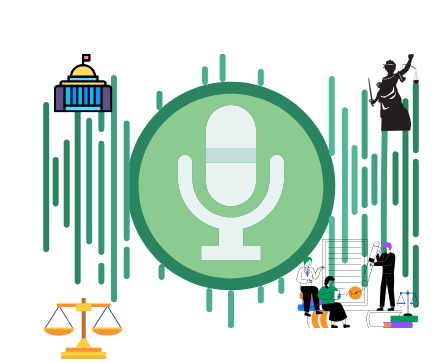

Voice recognition technology has emerged as a game-changing tool in the realm of legal transcription services, offering unprecedented efficiency, accuracy, and convenience. This transformative technology automates the process of transcribing spoken words into text, revolutionizing how legal professionals document, manage, and analyze information. From courtroom proceedings and client interviews to dictations and depositions, voice recognition technology has become an indispensable asset in the legal industry.
One of the primary benefits of voice recognition technology in legal transcription services is its ability to significantly reduce turnaround times. Traditionally, transcribing audio recordings manually could be a time-consuming task, requiring meticulous attention to detail and substantial human labor.
However, with voice recognition technology, this process is accelerated exponentially. Advanced algorithms and machine learning models can swiftly convert spoken words into text with remarkable speed and accuracy, enabling legal professionals to access transcriptions in near real-time.
Furthermore, voice recognition technology improves legal transcription services’ flexibility and accessibility. There’s no longer a need for legal practitioners to be desk-bound or to hire third parties to transcribe audio recordings. Lawyers can now dictate notes, memos, and case-related information using their smartphones or other portable devices, and voice recognition technology will automatically transcribe the text. This is made possible by the widespread availability of mobile applications and cloud-based platforms. Whether working in the office, in court, or on the go, legal professionals can now work more productively thanks to the smooth integration of transcription services into daily workflows.
Voice recognition technology not only makes transcription processes more efficient, but it also increases transcription accuracy. Although transcriptionists who are human might sometimes make mistakes or overlook subtleties in speech, voice recognition algorithms undergo constant improvement and training on large datasets, which leads to increased accuracy over time. These algorithms ensure that transcriptions are accurate copies of the original audio recordings by using natural language processing (NLP) and voice biometrics to distinguish between different speakers, recognize legal terminology, and adjust to different accents and speaking styles.
Additionally, voice recognition technology improves the confidentiality and security of private legal data. Robust encryption protocols and data security measures are used by cloud-based transcription platforms to protect client confidentiality and adhere to strict regulatory requirements. Legal practitioners can relax knowing that during the transcribing process, their private correspondence and case-related data are safeguarded, reducing the possibility of illegal access or data breaches.
Voice recognition technology in legal transcription services is not without its difficulties, though, even with all its benefits. Sometimes, accents, background noise, and technological constraints make transcription accuracy difficult to achieve, requiring human review and editing for quality control. In addition, legal practitioners need to be on the lookout for security and privacy issues related to voice recognition technology and make sure that pertinent laws like the General Data Protection Regulation (GDPR) and the Health Insurance Portability and Accountability Act (HIPAA) are followed.
Final Thoughts
In conclusion, voice recognition technology has completely changed the legal transcription market by providing legal professionals with unmatched speed, accuracy, and convenience. Voice recognition technology helps lawyers access accurate and timely transcriptions, increase productivity, and protect client confidentiality by automating the transcription process and utilizing sophisticated algorithms. The future of legal transcription services will surely be significantly shaped by the technology as it develops and becomes better.







